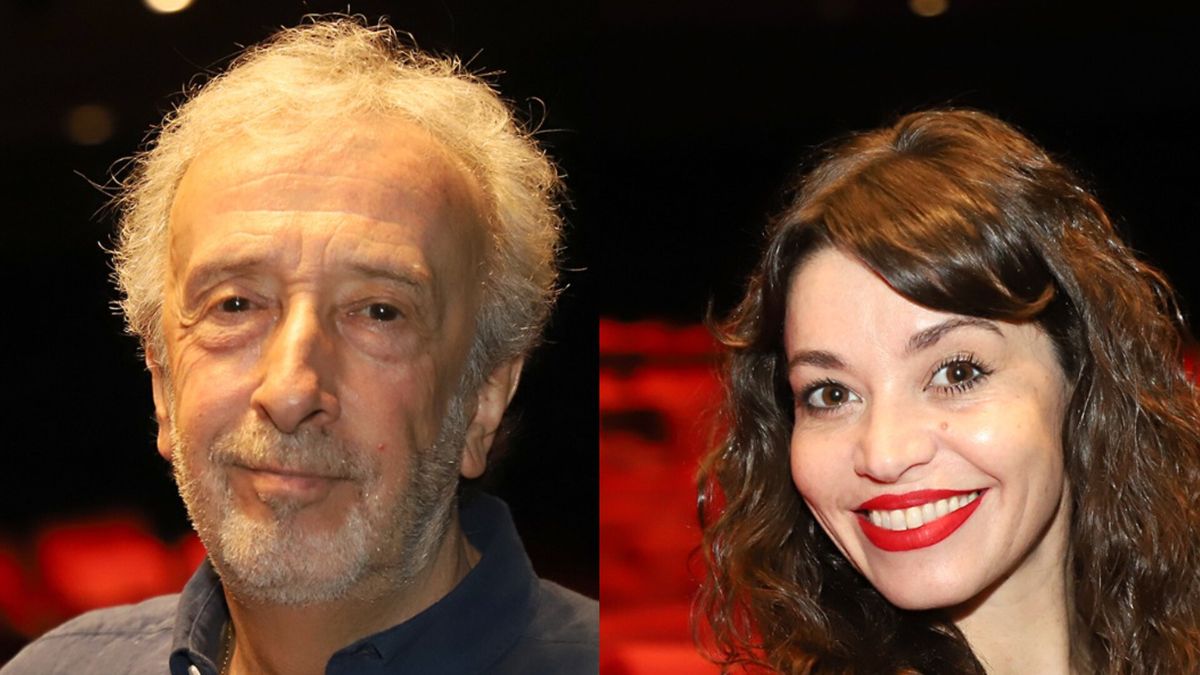“Campanella says action and begins to time the rehearsal, he is above all a storyteller,” says Eduardo Blanco regarding his new job with the director of “The Bride’s Son”, “The Secret in Her Eyes” and “Foosball.” Next to Fer Metilli They premiere on January 10 the new work by Juan José Campanella, “Starts with D, seven letters”, after his theatrical successes “Lezama Park” (eleven years on the bill), “What do we do with Walter?” and the restoration of the theater Politeama. We talk with White and Metilli.
Journalist: What’s new about this work by Campanella in relation to previous ones?
Eduardo Blanco: It is a love story between two families that hate each other, we could have a horrible novel or a “Romeo and Juliet” type of novel, what this one has is the Campanella seal. People who like their stories have fun, humor is essential, it also invites reflection and talks about connection. No matter how much it is a comedy, romantic, or dramatic, it invites you to take the other into account, as in “Parque Lezama”, when you think that life can’t give you anything else, life always challenges you, for better or worse. . That belief of “I don’t hurt myself anymore but I don’t enjoy myself anymore.” There is something about the non-existence of another today that I experience with sadness. Beyond the new technological elements that make us introspect, we make up a society and we are not seeing the other.
Eduardo Blanco Argentine actor Starts with D
Mariano Fuchila
Q.: Eduardo worked with the director, Fernanda, how did you receive this call from Campanella?
Fer Metilli: I thought it was a joke, I got a WhatsApp, he doesn’t have a photo, I heard the audio and couldn’t believe. He told me that he saw me in the works “Como el culo”, “Chorros”, “Immaturos” and that the character in his work had to do with my humor. “Even if I play the tree or cherry tree in the play, I wanted to be there,” I thought. I read it on my cell phone that same night and I liked the humor, how well written, he knows a lot, I laughed at imagining how those jokes executed by Eduardo would turn out.
Q: What can you say about the work?
FM: It has super funny situations, a lot of tenderness, I don’t like romantic movies but this one is it and I went in. With humor and realism it tells of a love encounter, the characters have fragility, they find a lot of reality within their weakness. I had to accommodate my year, which was all covered, to be able to be there. We are rehearsing in the theater that we will perform, it is not usual, generally we rehearse at home and when you go on stage you forget everything, you feel like you don’t know the words.
Q: What is Campanella like directing theater?
FM: I love it when he is very punctual, he is a film director so he is pragmatic, he lets you propose, it helps me that when something works he leaves it and marks it. Campanella says “Action” to pass the work, and starts with the stopwatch.
EB: With Brandoni we made jokes because he wanted each performance to turn out exactly the same and it is impossible. Campanella has been a theater spectator since he was 14 years old, he is a great storyteller in any format.
Fernanda Metilli Television Personality Starts with D

Mariano Fuchila
Q: What do you prefer, cinema, theater or TV?
FM: It’s another code and another concentration. There is something in theater that is different every day. In the theaters the audience is different, the work does not always come out the same, the text is not changed but it depends on each experience. In audiovisual, you made a scene, you threw out the lyrics and you make a mental mess that goes away, you learn it in 3 minutes, in theater it is the opposite.
EB: In TV and cinema it is similar, I remember on free-to-air TV that they gave you the book and you recorded it in 15 minutes. The actor’s natural place is the theater, things happen there that don’t happen in other areas. To begin with, the story is told from beginning to end, in cinema it is like a puzzle, you can start with the last scene. Theater is that wonder that is told from beginning to end, with a natural path. The theater has the adrenaline of the live, the actors are in contact with the public and without a network. In film you did the scene once well and that’s it.
Q: How do you see cinema and culture?
EB: I see it with sadness, a country exceeds numbers and results, it contains people, education, culture, athletes, science make the country great, that is, us. Now it seems that the only thing they have to close are the numbers, I understand, we have experienced horrible nonsense, as a result of which we have what we have. Wanting to make people believe that their misfortunes are the artists because the cinema takes money for education or retirees, is perversity and a lie. They misinform, regardless of the fact that I think many things should be corrected. “The Bride’s Son” premiered in the world because it was nominated for an Oscar and that made people want to get to know the country. Buenos Aires is a world theater power, people come from outside for 4 days to see theater, that is not measured at an economic level. For cinema, there is no country that does not have support, the best example is France, in the US they sell you packages of films, never an isolated one.
FM: The discussion is taken to something partisan and not cultural, which is what gives us identity. When the debate is limited only to a number, it is poorly addressed.
Source: Ambito
I am Pierce Boyd, a driven and ambitious professional working in the news industry. I have been writing for 24 Hours Worlds for over five years, specializing in sports section coverage. During my tenure at the publication, I have built an impressive portfolio of articles that has earned me a reputation as an experienced journalist and content creator.




